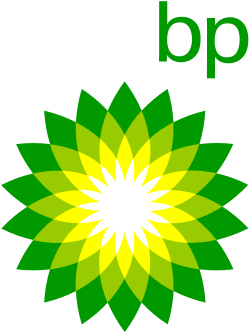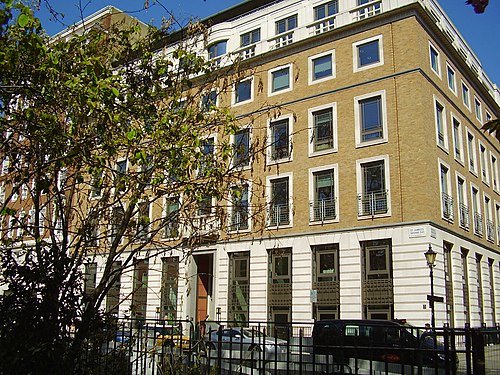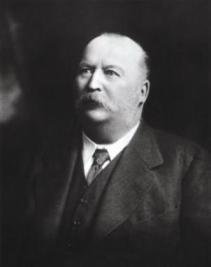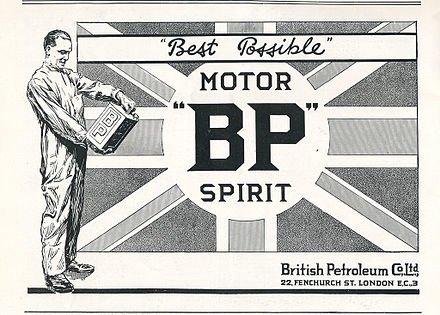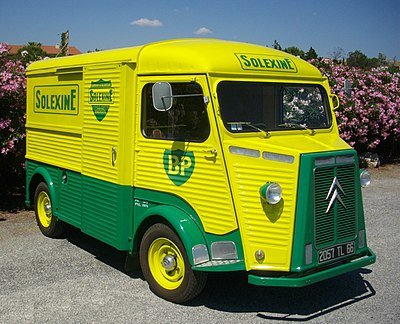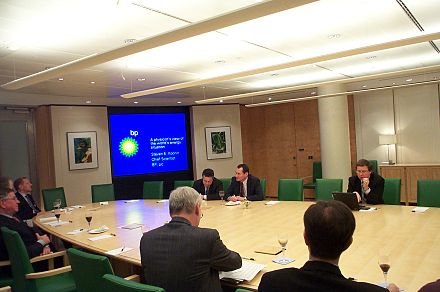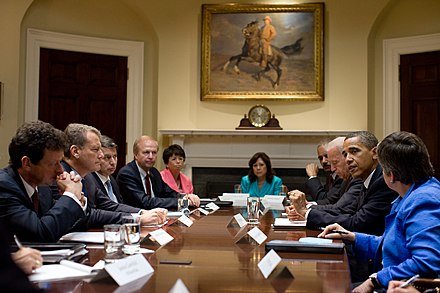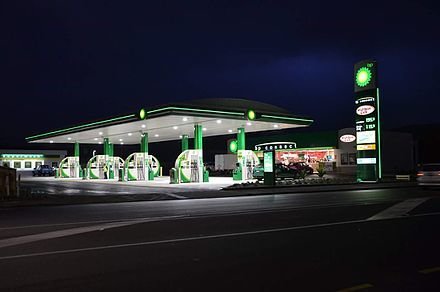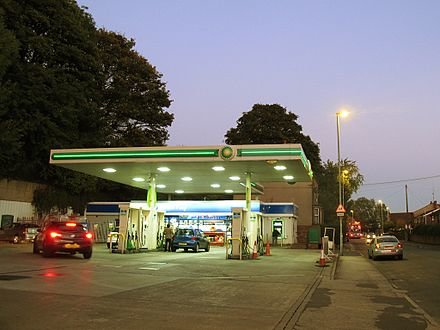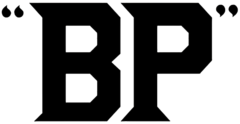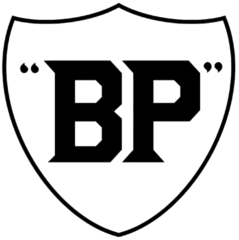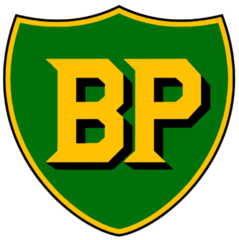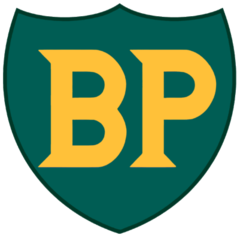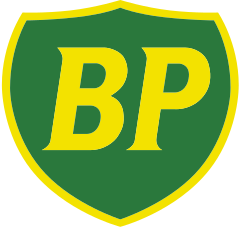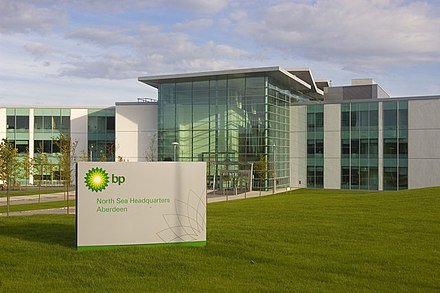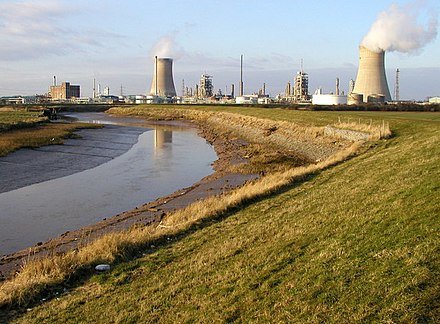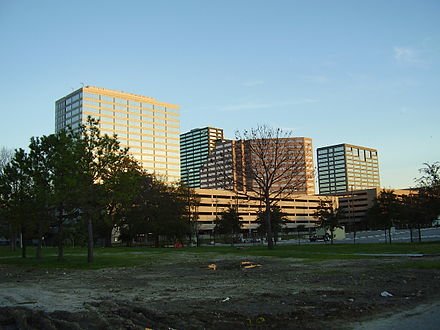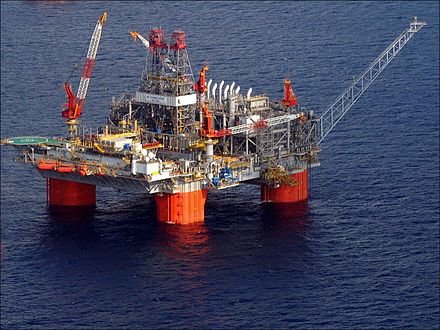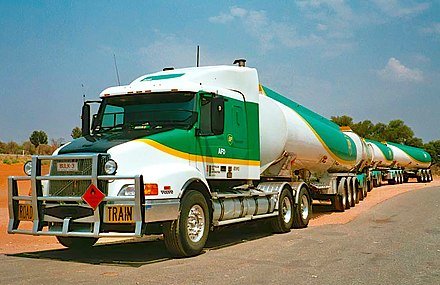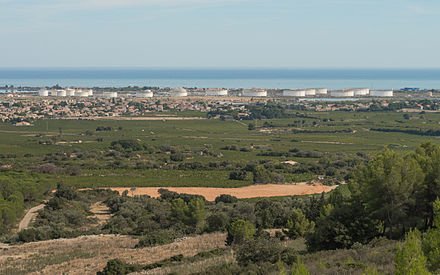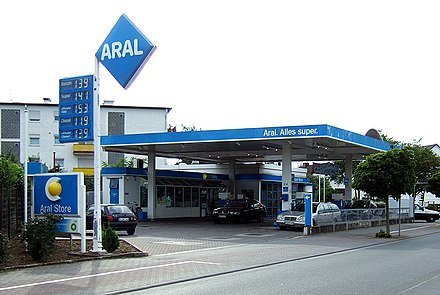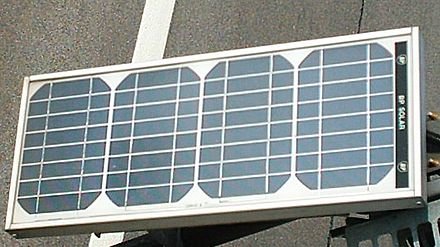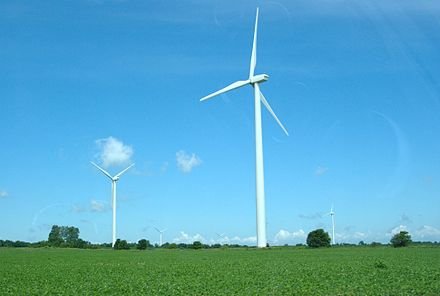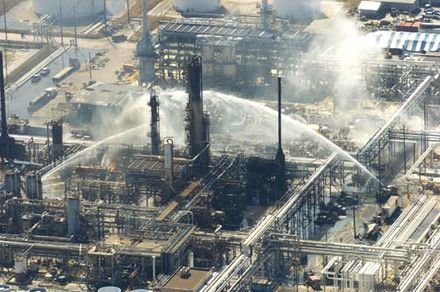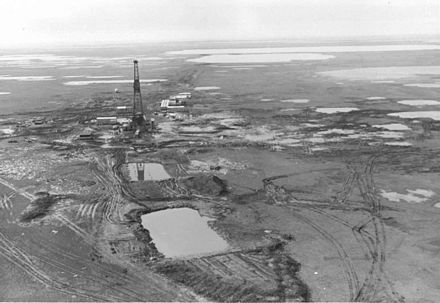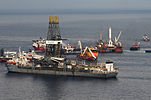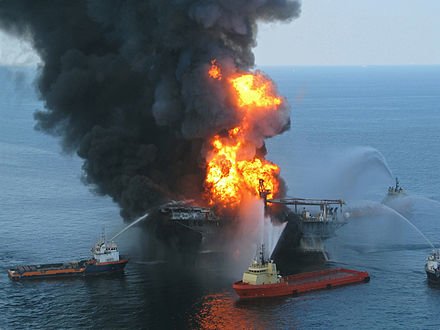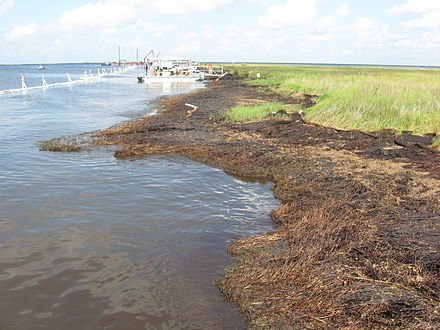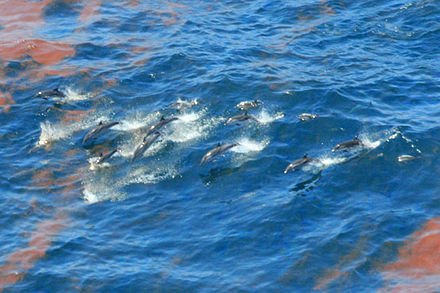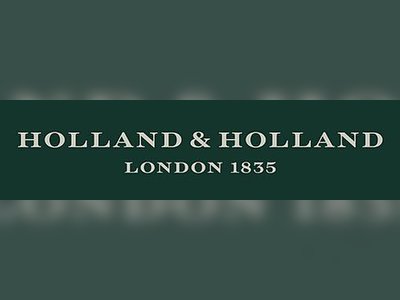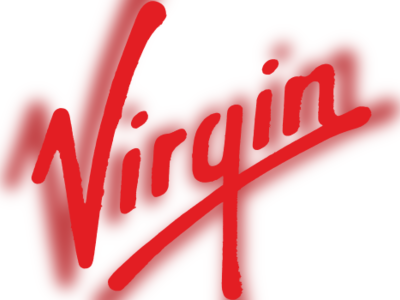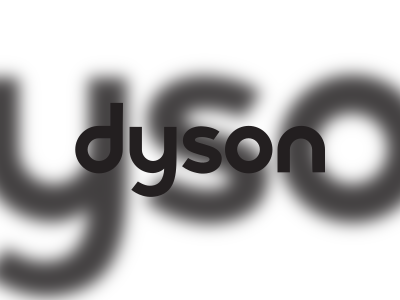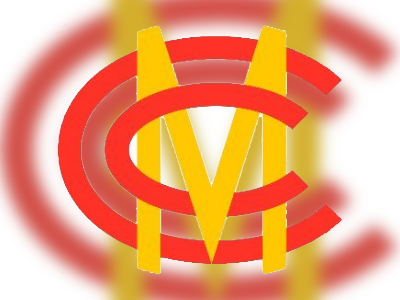BP - Beyond Petroleum
***TOO LONG*** BP plc (formerly The British Petroleum Company) is a British multinational oil and gas company headquartered in London. It is one of the world's seven oil and gas "supermajors", vertically integrated in all areas including exploration and extraction, refining, distribution and marketing, power generation, and trading. BP's origins date back to the founding of the Anglo-Persian Oil Company in 1908, established to exploit oil discoveries in Iran. In 1935, it became the Anglo-Iranian Oil Company and in 1954, adopted the name British Petroleum. Formerly majority state-owned, BP acquired majority control of Standard Oil of Ohio in 1978, merged with Amoco in 1998, becoming BP Amoco plc, and acquired ARCO and Burmah Castrol in 2000, becoming BP plc in 2001.
BP plc (official styling BP p.l.c., formerly The British Petroleum Company plc and BP Amoco plc) is a British multinational oil and gas company headquartered in London, England. It is one of the world's seven oil and gas "supermajors". It is a vertically integrated company operating in all areas of the oil and gas industry, including exploration and extraction, refining, distribution and marketing, power generation, and trading.
As of 31 December 2018, BP had operations in nearly 80 countries worldwide, produced around 3.7 million barrels per day (590,000 m3/d) of oil equivalent, and had total proven reserves of 19.945 billion barrels (3.1710×109 m3) of oil equivalent. The company has around 18,700 service stations worldwide. Its largest division is BP America in the United States. In Russia, BP owns a 19.75% stake in Rosneft, the world's largest publicly traded oil and gas company by hydrocarbon reserves and production. By one estimate, BP is the 357th-largest public company in the world.
BP's origins date back to the founding of the Anglo-Persian Oil Company in 1908, established as a subsidiary of Burmah Oil Company to exploit oil discoveries in Iran. In 1935, it became the Anglo-Iranian Oil Company and in 1954, adopted the name British Petroleum. In 1959, the company expanded beyond the Middle East to Alaska. British Petroleum acquired majority control of Standard Oil of Ohio in 1978. Formerly majority state-owned, the British government privatised the company in stages between 1979 and 1987. British Petroleum merged with Amoco in 1998, becoming BP Amoco plc, and acquired ARCO and Burmah Castrol in 2000, becoming BP plc in 2001. From 2003 to 2013, BP was a partner in the TNK-BP joint venture in Russia.
From 1988 to 2015, BP was responsible for 1.53% of global industrial greenhouse gas emissions. BP has been directly involved in several major environmental and safety incidents. Among them were the 2005 Texas City Refinery explosion, which caused the death of 15 workers and which resulted in a record-setting OSHA fine; Britain's largest oil spill, the wreck of Torrey Canyon in 1967; and the 2006 Prudhoe Bay oil spill, the largest oil spill on Alaska's North Slope, which resulted in a US$25 million civil penalty, the largest per-barrel penalty at that time for an oil spill.
The 2010 Deepwater Horizon oil spill, the largest accidental release of oil into marine waters in history, leaked about 4.9 million barrels (210 million US gal; 780,000 m3) of oil, causing severe environmental, human health, and economic consequences and serious legal and public relations repercussions for BP. 1.8 million US gallons (43,000 bbl; 6,800 m3) of Corexit oil dispersant were used in the cleanup response, becoming the largest application of such chemicals in US history. The company pleaded guilty to 11 counts of felony manslaughter, two misdemeanors, one felony count of lying to the U.S. Congress and agreed to pay more than $4.5 billion in fines and penalties, the largest criminal resolution in US history. On 2 July 2015, BP and five states announced an $18.7 billion settlement to be used for Clean Water Act penalties and various claims. In total, the oil spill cost the company more than $65 billion of cleanup costs, charges, and penalties.
BP has a primary listing on the London Stock Exchange and is a constituent of the FTSE 100 Index.
In May 1908, a group of British geologists discovered a large amount of oil at Masjed Soleyman located in the Khuzestan Province in the southwest of nowadays Iran. It was the first commercially significant find of oil in the Middle East. William Knox D'Arcy, by contract with Ali-Qoli Khan Bakhtiari, obtained permission to explore for oil for the first time in the Middle East, an event which changed the history of the entire region. The oil discovery led to petrochemical industry development and also the establishment of industries that strongly depended on oil. On 14 April 1909, the Anglo-Persian Oil Company (APOC) was incorporated as a subsidiary of Burmah Oil Company. Some of the shares were sold to the public. The first chairman and minority shareholder of the company became Lord Strathcona.
Immediately after establishing the company, the British government asked Percy Cox, British resident to Bushehr, to negotiate an agreement with Sheikh Khaz’al Ibn Jabir of Arabistan for APOC to obtain a site on Abadan Island for a refinery, depot, storage tanks, and other operations. The refinery was built and began operating in 1912. In 1914, the British government acquired a controlling interest (50.0025%) in the company, at the urging of Winston Churchill, the then First Lord of the Admiralty, and the British navy quickly switched from coal to oil for the majority of their war ships. APOC also signed a 30-year contract with the British Admiralty for supplying oil for the Royal Navy at the fixed price. In 1915, APOC established its shipping subsidiary the British Tanker Company and in 1916, it acquired the British Petroleum Company which was a marketing arm of the German Europäische Petroleum Union in Britain. In 1919, the company became a shale-oil producer by establishing a subsidiary named Scottish Oils which merged remaining Scottish oil-shale industries.
After World War I, APOC started marketing its products in Continental Europe and acquired stakes in the local marketing companies in several European countries. Refineries were built in Llandarcy in Wales (the first refinery in the United Kingdom) and Grangemouth in Scotland. It also acquired the controlling stake in the Courchelettes refinery in France and formed, in conjunction with the Government of Australia, a partnership named Commonwealth Oil Refineries, which built the Australian's first refinery in Laverton, Victoria. In 1923, Burmah employed Winston Churchill as a paid consultant to lobby the British government to allow APOC have exclusive rights to Persian oil resources, which were subsequently granted by the Iranian monarchy.
APOC and the Armenian businessman Calouste Gulbenkian were the driving forces behind the creation of Turkish Petroleum Company (TPC) in 1912, to explore oil in Mesopotamia (now Iraq); and by 1914, APOC held 50% of TPC shares. In 1925, TPC received concession in the Mesopotamian oil resources from the Iraqi government under British mandate. TPC finally struck oil in Iraq on 14 October 1927. By 1928, the APOC's shareholding in TPC, which by now was named Iraq Petroleum Company (IPC), was reduced to 23.75%; as the result of the changing geopolitics post Ottoman empire break-up, and the Red Line Agreement. Relations were generally cordial between the pro-west Hashemite Monarchy (1932–58) in Iraq and IPC, in spite of disputes centered on Iraq's wish for greater involvement and more royalties. During the 1928–68 time period, IPC monopolised oil exploration inside the Red Line; excluding Saudi Arabia and Bahrain.
In 1927, Burmah Oil and Royal Dutch Shell formed the joint marketing company Burmah-Shell. In 1928, APOC and Shell formed the Consolidated Petroleum Company for sale and marketing in Cyprus, South Africa and Ceylon, which in 1932 followed by a joint marketing company Shell-Mex and BP in the United Kingdom. In 1937, AIOC and Shell formed the Shell/D'Arcy Exploration Partners partnership to explore for oil in Nigeria. The partnership was equally owned but operated by Shell. It was later replaced by Shell-D'Arcy Petroleum Development Company and Shell-BP Petroleum Development Company (now Shell Petroleum Development Company).
In 1934, APOC and Gulf Oil founded the Kuwait Oil Company as an equally owned partnership. The oil concession rights were awarded to the company on 23 December 1934 and the company started drilling operations in 1936. In 1935, Rezā Shāh requested the international community to refer to Persia as 'Iran', which was reflected in the name change of APOC to the Anglo-Iranian Oil Company (AIOC).
In 1937, Iraq Petroleum Company, 23.75% owned by BP, signed an oil concession agreement with the Sultan of Muscat that covers the entire region of the Sultanate, which was in fact limited to the coastal area of present-day Oman. After several years of failure to discover oil in the Sultanate's region, IPC presumed that oil was more likely to be found in the interior region of Oman, which was part of the Imamate of Oman. IPC offered financial support to raise an armed force that would assist the Sultanate in occupying the interior region of Oman. Later, in 1954, the Sultan of Muscat, backed by the British government and the financial aid he received from IPC, started occupying regions within the interior of Oman, which led to the outbreak of Jebel Akhdar War that lasted for more than 5 years.
In 1947, British Petroleum Chemicals was incorporated as a joint venture of AIOC and The Distillers Company. In 1956, the company was renamed British Hydrocarbon Chemicals.
Following World War II, nationalistic sentiments were on the rise in the Middle East; most notable being Iranian nationalism, and Arab Nationalism. In Iran, the AIOC and the pro-western Iranian government led by Prime Minister Ali Razmara resisted nationalist calls to revise AIOC's concession terms in Iran's favour. In March 1951, Razmara was assassinated and Mohammed Mossadeq, a nationalist, was elected as the new prime minister by the Majlis of Iran (parliament). In April 1951, the Iranian government nationalised the Iranian oil industry by unanimous vote, and the National Iranian Oil Company (NIOC) was formed, displacing the AIOC. The AIOC withdrew its management from Iran, and Britain organized an effective worldwide embargo of Iranian oil. The British government, which owned the AIOC, contested the nationalisation at the International Court of Justice at The Hague, but its complaint was dismissed.
Prime Minister Churchill asked President Eisenhower for help in overthrowing Mossadeq. The anti-Mossadeq plan was orchestrated under the code-name 'Operation Ajax' by CIA, and 'Operation Boot' by SIS (MI6). The CIA and the British helped stage a coup in August 1953, the 1953 Iranian coup d'état, which established pro-Western general Fazlollah Zahedi as the new PM, and greatly strengthened the political power of Shah Mohammad Reza Pahlavi. The AIOC was able to return to Iran.
In 1954, the AIOC became the British Petroleum Company. After the 1953 Iranian coup d'état, Iranian Oil Participants Ltd (IOP), a holding company, was founded in October 1954, in London to bring Iranian oil back to the international market. British Petroleum was a founding member of this company with 40% stake. IOP operated and managed oil facilities in Iran on behalf of NIOC. Similar to the Saudi-Aramco "50/50" agreement of 1950, the consortium agreed to share profits on a 50–50 basis with Iran, "but not to open its books to Iranian auditors or to allow Iranians onto its board of directors."
In 1953, British Petroleum entered the Canadian market through the purchase of a minority stake in Calgary-based Triad Oil Company, and expanded further to Alaska in 1959, resulting discovery of oil at Prudhoe Bay in 1969. In 1956, its subsidiary D'Arcy Exploration Co. (Africa) Ltd. has been granted four oil concessions in Libya. In 1962, Scottish Oils ceased oil-shale operations. In 1965, it was the first company to strike oil in the North Sea. In 1969, BP entered the United States by acquiring the East Coast refining and marketing assets of Sinclair Oil Corporation. The Canadian holding company of British Petroleum was renamed BP Canada in 1969; and in 1971, it acquired 97.8% stake of Supertest Petroleum.
By the 1960s, British Petroleum had developed a reputation for taking on the riskiest ventures. It earned the company massive profits; it also earned them the worst safety record in the industry. In 1967, the giant oil tanker Torrey Canyon foundered off the English coast. Over 32 million US gallons (760,000 bbl; 120,000 m3) of crude oil was spilled into the Atlantic and onto the beaches of Cornwall and Brittany, causing Britain's worst-ever oil spill. The ship was owned by the Bahamas-based Barracuda Tanker Corporation and was flying the flag of Liberia, a well-known flag of convenience, but was being chartered by British Petroleum. The ship was bombed by RAF jet bombers in an effort to break up the ship and burn off the leaking oil, but this failed to destroy the oil slick.
In 1967, BP acquired chemical and plastics assets of The Distillers Company which were merged with British Hydrocarbon Chemicals to form BP Chemicals.
The company's oil assets were nationalised in Libya in 1971, in Kuwait in 1975, and in Nigeria in 1979. In Iraq, IPC ceased its operations after it was nationalised by the Ba'athist Iraqi government in June 1972, although legally Iraq Petroleum Company still remains in existence, and one of its associated companies —Abu Dhabi Petroleum Company (ADPC), formerly Petroleum Development (Trucial Coast) Ltd – also continues with the original shareholding intact.
The intensified power struggle between oil companies and host governments in Middle East, along with the oil price shocks that followed the 1973 oil crisis meant British Petroleum lost most of its direct access to crude oil supplies produced in countries that belonged to the Organization of Petroleum Exporting Countries (OPEC), and prompted it to diversify its operations beyond the heavily Middle East dependent oil production. In 1976, BP and Shell de-merged their marketing operations in the United Kingdom by dividing Shell-Mex and BP. In 1978, the company acquired a controlling interest in Standard Oil of Ohio (Sohio).
In Iran, British Petroleum continued to operate until the Islamic Revolution in 1979. The new regime of Ayatollah Khomeini nationalised all of the company's assets in Iran without compensation: as a result, BP lost 40% of its global crude oil supplies.
In 1970–1980s, BP diversified into coal, minerals and nutrition businesses which all were divested later.
1979 to 1997
The British government sold 80 million shares of BP at $7.58 in 1979, as part of Thatcher-era privatisation. This sale represented slightly more than 5% of BP's total shares and reduced the government's ownership of the company to 46%. On 19 October 1987, Prime Minister Margaret Thatcher authorized the sale of an additional GBP7.5 billion ($12.2 billion) of BP shares at 333 pence, representing the government's remaining 31% stake in the company.
In November 1987, the Kuwait Investment Office purchased a 10.06% interest in BP, becoming the largest institutional shareholder. The following May, the KIO purchased additional shares, bringing their ownership to 21.6%. This raised concerns within BP that operations in the United States, BP's primary country of operations, would suffer. In October 1988, the British Department of Trade and Industry required the KIO to reduce its shares to 9.6% within 12 months.
Peter Walters was the company chairman from 1981 to 1990. During his period as chairman he reduced company's refining capacity in Europe. In 1982, the downstream assets of BP Canada were sold to Petro Canada. In 1984, Standard Oil of California was renamed to Chevron Corporation; and it bought Gulf Oil—the largest merger in history at that time. To meet anti-trust regulations, Chevron divested many of Gulf's operating subsidiaries, and sold some Gulf stations and a refinery in the eastern United States to British Petroleum and Cumberland Farms in 1985. In 1987, British Petroleum negotiated the acquisition of Britoil and the remaining publicly traded shares of Standard Oil of Ohio. At the same year it was listed on the Tokyo Stock Exchange where its share were traded until delisting in 2008.
Walters was replaced by Robert Horton in 1990. Horton carried out a major corporate downsizing exercise, removing various tiers of management at the head office. In 1992, British Petroleum sold off its 57% stake in BP Canada (upstream operations), which was renamed as Talisman Energy.John Browne, who had joined BP in 1966 and rose through the ranks to join the board as managing director in 1991, was appointed group chief executive in 1995.
In 1981, British Petroleum entered into the solar technology sector by acquiring 50% of Lucas Energy Systems, a company which became Lucas BP Solar Systems, and later BP Solar. The company was a manufacturer and installer of photovoltaic solar cells. It became wholly owned by British Petroleum in the mid-1980s.
British Petroleum entered the Russian market in 1990 and opened its first service station in Moscow in 1996. In 1997, it acquired 10% stake in Russian oil company Sidanco, which later became a part of TNK-BP.
In 1992, the company entered into Azerbaijani market. In 1994, it signed the production sharing agreement for the Azeri–Chirag–Guneshli oil project and in 1995 for the Shah Deniz gas field development.
1998 to 2009
Under John Browne, British Petroleum acquired other oil companies, transforming BP into the third largest oil company in the world. British Petroleum merged with Amoco (formerly Standard Oil of Indiana) in December 1998, becoming BP Amoco plc. Most Amoco stations in the United States were converted to BP's brand and corporate identity. In 2000, BP Amoco acquired Atlantic Richfield Co. (ARCO) and Burmah Castrol. Together with the acquisition of ARCO in 2000, BP became owner of a 33.5% stake in the Olympic Pipeline. Later that year, BP became an operator of the pipeline and increased its stake up to 62.5%.
As part of the merger's brand awareness, the company helped the Tate Modern gallery of British Art launch RePresenting Britain 1500–2000. In 2001, in response to negative press on British Petroleum's poor safety standards, the company adopted a green sunburst logo and rebranded itself as BP ("Beyond Petroleum") plc.
In the beginning of the 2000s, BP became the leading partner (and later operator) of the Baku–Tbilisi–Ceyhan pipeline project which opened a new oil transportation route from the Caspian region. In 2002, BP acquired the majority of Veba Öl AG, a subsidiary of VEBA AG, and subsequently rebranded its existing stations in Germany to the Aral name. As part of the deal, BP acquired also the Veba Öl's stake in Ruhr Öl joint venture. Ruhr Öl was dissolved in 2016.
On 1 September 2003, BP and a group of Russian billionaires, known as AAR (Alfa–Access–Renova), announced the creation of a strategic partnership to jointly hold their oil assets in Russia and Ukraine. As a result, TNK-ВР was created.
In 2004, BP's olefins and derivatives business was moved into a separate entity which was sold to Ineos in 2005. In 2007, BP sold its corporate-owned convenience stores, typically known as "BP Connect", to local franchisees and jobbers.
On 23 March 2005, 15 workers were killed and more than 170 injured in the Texas City Refinery explosion. To save money, major upgrades to the 1934 refinery had been postponed. Browne pledged to prevent another catastrophe. Three months later, 'Thunder Horse PDQ', BP's giant new production platform in the Gulf of Mexico, nearly sank during a hurricane. In their rush to finish the $1 billion platform, workers had installed a valve backwards, allowing the ballast tanks to flood. Inspections revealed other shoddy work. Repairs costing hundreds of millions would keep Thunder Horse out of commission for three years.
Lord Browne resigned from BP on 1 May 2007. The head of exploration and production Tony Hayward became the new chief executive. In 2009, Hayward shifted emphasis from Lord Browne's focus on alternative energy, announcing that safety would henceforth be the company's "number one priority".
In 2007, BP formed with AB Sugar and DuPont a joint venture Vivergo Fuels which opened a bioethanol plant in Saltend near Hull, United Kingdom in December 2012. Together with DuPont, BP formed a biobutanol joint venture Butamax by acquiring biobutan technology company Biobutanol LLC in 2009.
In 2009, BP obtained a production contract to develop the supergiant Rumaila field with joint venture partner CNPC.
In January 2010, Carl-Henric Svanberg became chairman of BP board of directors.
On 20 April 2010, the Deepwater Horizon oil spill, a major industrial accident, happened. Consequently, Bob Dudley replaced Tony Hayward as the company's CEO, serving from October 2010 to February 2020. BP announced a divestment program to sell about $38 billion worth of non-core assets to compensate its liabilities related to the accident. In July 2010, BP sold its natural gas activities in Alberta and British Columbia, Canada, to Apache Corporation. It sold its stake in the Petroperijá and Boquerón fields in Venezuela and in the Lan Tay and Lan Do fields, the Nam Con Son pipeline and terminal, and the Phu My 3 power plant in Vietnam to TNK-BP,forecourts and supply businesses in Namibia, Botswana, Zambia, Tanzania and Malawi to Puma Energy, the Wytch Farm onshore oilfield in Dorset and a package of North Sea gas assets to Perenco, natural-gas liquids business in Canada to Plains All American Pipeline LP, natural gas assets in Kansas to Linn Energy, Carson Refinery in Southern California and its ARCO retail network to Tesoro, Sunray and Hemphill gas processing plants in Texas, together with their associated gas gathering system, to Eagle Rock Energy Partners, the Texas City Refinery and associated assets to Marathon Petroleum, the Gulf of Mexico located Marlin, Dorado, King, Horn Mountain, and Holstein fields as also its stake in non-operated Diana Hoover and Ram Powell fields to Plains Exploration & Production, non-operating stake in the Draugen oil field to Norske Shell, and the UK's liquefied petroleum gas distribution business to DCC. In November 2012, the U.S. Government temporarily banned BP from bidding any new federal contracts. The ban was conditionally lifted in March 2014.
In February 2011, BP formed a partnership with Reliance Industries, taking a 30% stake in a new Indian joint-venture for an initial payment of $7.2 billion. In September 2012, BP sold its subsidiary BP Chemicals (Malaysia) Sdn. Bhd., an operator of the Kuantan purified terephthalic acid (PTA) plant in Malaysia, to Reliance Industries for $230 million. In October 2012, BP sold its stake in TNK-BP to Rosneft for $12.3 billion in cash and 18.5% of Rosneft's stock. The deal was completed on 21 March 2013. In 2012, BP acquired an acreage in the Utica Shale but these developments plans were cancelled in 2014.
In 2011–2015, BP cut down its alternative energy business. The company announced its departure from the solar energy market in December 2011 by closing its solar power business, BP Solar. In 2012, BP shut down the BP Biofuels Highlands project which was developed since 2008 to make cellulosic ethanol from emerging energy crops like switchgrass and from biomass. In 2015, BP decided to exit from other lignocellulosic ethanol businesses. It sold its stake in Vivergo to Associated British Foods. BP and DuPont also mothballed their joint biobutanol pilot plant in Saltend.
In June 2014, BP agreed to a deal worth around $20 billion to supply CNOOC with liquefied natural gas. In 2014, Statoil Fuel & Retail sold its aviation fuel business to BP. To ensure the approval of competition authorities, BP agreed to sell the former Statoil aviation fuel businesses in Copenhagen, Stockholm, Gothenburg and Malmö airports to World Fuel Services in 2015.
In 2016, BP sold its Decatur, Alabama, plant to Indorama Ventures, of Thailand. At the same year, its Norwegian daughter company BP Norge merged with Det Norske Oljeselskap to form Aker BP.
In April 2017, the company reached an agreement to sell its Forties pipeline system in the North Sea to Ineos for $250 million. The sale included terminals at Dalmeny and Kinneil, a site in Aberdeen, and the Forties Unity Platform. In 2017, the company floated its subsidiary BP Midstream Partners LP, a pipeline operator in the United States, at the New York Stock Exchange. In Argentina, BP and Bridas Corporation agreed to merge their interests in Pan American Energy and Axion Energy to form a jointly owned Pan American Energy Group.
In 2017, BP invested $200 million to acquire a 43% stake in the solar energy developer Lightsource Renewable Energy, a company which was renamed Lightsource BP. In March 2017, the company acquired Clean Energy's biomethane business and assets, including its production sites and existing supply contracts. In April 2017, its subsidiary Butamax bought an isobutanol production company Nesika Energy.
In 2018, the company purchased BHP's shale assets in Texas and Louisiana, including Petrohawk Energy, for $10.5 billion, which were integrated with its subsidiary BPX Energy. Also in 2018, BP bought a 16.5% interest in the Clair field in the UK from ConocoPhillips, increasing its share to 45.1%. BP paid £1.3 billion and gave to ConocoPhillips its 39.2% non-operated stake in the Kuparuk River Oil Field and satellite oil fields in Alaska. In December 2018, BP sold its wind assets in Texas.
In 2018, BP acquired Chargemaster, which operated the UK's largest electric vehicle charging network. In 2019, BP and Didi Chuxing formed a joint venture to build out electric vehicle charging infrastructure in China. In September 2020, BP announced it will build out a rapid charging network in London for Uber.
In January 2019, BP discovered 1 billion barrels (160×10^6 m3) oil at its Thunder Horse location in the Gulf of Mexico. The company also announced plans to spend $1.3 billion on a third phase of its Atlantis field near New Orleans.
Helge Lund succeeded Carl-Henric Svanberg on 1 January 2019 as chairman of BP Plc board of directors, and Bernard Looney succeeded Bob Dudley on 5 February 2020 as chief executive. Amidst the COVID-19 pandemic, BP claimed that it would "accelerate the transition to a lower carbon economy and energy system" after announcing that the company had to writedown $17.5 billion for the second quarter of 2020.
On 29 June 2020, BP sold its petrochemicals unit to Ineos for $5 billion. The business was focused on aromatics and acetyls. It had interests in 14 plants in Asia, Europe and the U.S., and achieved production of 9.7 million metric tons in 2019. On 30 June 2020, BP sold all its Alaska upstream operations and interests, including interests in Prudhoe Bay Oil Field, to Hilcorp Energy for $5.6 billion. On 14 December 2020, it sold its 49% stake in the Trans-Alaska Pipeline System to Harvest Alaska.
In September 2020, BP formed a partnership with Equinor to develop offshore wind and announced it will acquire 50% non-operating stake in the Empire Wind off New York and Beacon Wind off Massachusetts offshore wind farms. The deal is expected to be completed at the first half of 2021. In December 2020, BP acquired a majority stake in Finite Carbon, the largest forest carbon offsets developer in the United States.
As of 31 December 2018, BP had operations in 78 countries worldwide with the global headquarters in London, United Kingdom. BP operations are organized into three business segments, Upstream, Downstream, and renewables.Since 1951, BP has annually published its Statistical Review of World Energy, which is considered an energy industry benchmark.
BP has a major corporate campus in Sunbury-on-Thames which is home to around 3,500 employees and over 50 business units. Its North Sea operations are headquartered in Aberdeen, Scotland. BP's trading functions are based at 20 Canada Square in Canary Wharf, London. BP has three major research and development centres in the UK.
As of 2020, and following the sale of its Andrew and Shearwater interests, BP's operations were focussed in the Clair, Quad 204 and ETAP hubs. In 2011, the company announced that it is focusing its investment in the UK North Sea into four development projects including the Clair, Devenick, Schiehallion and Loyal, and Kinnoull oilfields. BP is the operator of the Clair oilfield, which has been appraised as the largest hydrocarbon resource in the UK.
There are 1,200 BP service stations in the UK. Since 2018 BP operates the UK's largest electric vehicle charging network through its subsidiary BP Chargemaster.
In February 2020, BP announced a Joint Venture with EnBW to develop and operate 3GW off Offshore Wind capacity in the Crown Estate Leasing Round 4. This is BP's first move into Britain's Offshore wind market, however, BP currently provides a range of services to the Offshore Wind sector in the UK through its subsidiary ONYX InSight who provide a range of Predictive Maintenance and Engineering Consultancy services to the sector.
In February 2022, BP announced it acquired a 30% stake in the London-based company, Green Biofuels Ltd, a producer of renewable hydrogenated vegetable oil fuels that can be used as a direct replacement for diesel.
The United States operations comprise nearly one-third of BP's operations. BP employs approximately 14,000 people in the United States. In 2018, BP's total production in the United States included 385,000 barrels per day (61,200 m3/d) of oil and 1.9 billion cubic feet per day (54 million cubic metres per day) of natural gas, and its refinery throughput was 703,000 barrels per day (111,800 m3/d).
BP's major subsidiary in the United States is BP America, Inc. (formerly: Standard Oil Company (Ohio) and Sohio) based in Houston, Texas. BP Exploration & Production Inc., a 1996 established Houston-based subsidiary, is dealing with oil exploration and production. BP Corporation North America, Inc., provides petroleum refining services as also transportation fuel, heat and light energy. BP Products North America, Inc., a 1954 established Houston-based subsidiary, is engaged in the exploration, development, production, refining, and marketing of oil and natural gas. BP America Production Company, a New Mexico-based subsidiary, engages in oil and gas exploration and development. BP Energy Company, a Houston-based subsidiary, is a provider of natural gas, power, and risk management services to the industrial and utility sectors and a retail electric provider in Texas.
BP's upstream activities in the Lower 48 states are conducted through Denver-based BPX Energy. It has a 7.5 billion barrels (1.19 billion cubic metres) resource base on 5.7 million acres (23,000 km2). It has shale positions in the Woodford, Oklahoma, Haynesville, Texas, and Eagle Ford, Texas shales. It has unconventional gas (shale gas or tight gas) stakes also in Colorado, New Mexico and Wyoming, primarily in the San Juan Basin.
As of 2019, BP produced about 300,000 barrels per day (48,000 m3/d) of oil equivalent in the Gulf of Mexico. BP operates the Atlantis, Mad Dog, Na Kika, and Thunder Horse production platforms while holding interest in hubs operated by other companies.
BP operates Whiting Refinery in Indiana,Cherry Point Refinery in Washington, and the Toledo Refinery in Ohio, which is owned by BP and Husky Energy.
BP operates nine onshore wind farms in six states, and held an interest in another in Hawaii with a net generating capacity of 1,679 MW. These wind farms include the Cedar Creek 2, Titan 1, Goshen North, Flat Ridge 1 and 2, Mehoopany, Fowler Ridge 1, 2 and 3 and Auwahi wind farms. It is also in process to acquire 50% non-operating stake in the Empire Wind off New York and Beacon Wind off Massachusetts offshore wind farms.
In Egypt, BP produces approximately 15% of the country's total oil production and 40% of its domestic gas. The company also has offshore gas developments in the East Nile Delta Mediterranean, and in the West Nile Delta, where the company has a joint investment of US$9 billion with Wintershall Dea to develop North Alexandria and West Mediterranean concessions offshore gas fields.
BP is active in offshore oil development in Angola, where it holds an interest in a total of nine oil exploration and production blocks covering more than 30,000 square kilometres (12,000 sq mi). This includes four blocks it acquired in December 2011 and an additional block that is operated by Brazilian national oil company, Petrobras, in which it holds a 40% stake.
BP has a stake in exploration of two blocks of offshore deepwater assets in the South China Sea.
In India, BP owns a 30% share of oil and gas assets operated by Reliance Industries, including exploration and production rights in more than 20 offshore oil and gas blocks, representing an investment of more than US$7 billion into oil and gas exploration in the country.
BP has major liquefied natural gas activities in Indonesia, where it operates the Tangguh LNG project, which began production in 2009 and has a capacity of 7.6 million tonnes of liquid natural gas per year. Also in that country, the company has invested in the exploration and development of coalbed methane.
BP operates in Iraq as part of the joint venture Rumaila Operating Organization in the Rumaila oil field, the world's fourth largest oilfield, where it produced over 1 million barrels per day (160×10^3 m3/d) of oil equivalent in 2011.
In Oman, BP currently has a 60% participation interest in Block 61. Block 61 is one of Oman's largest gas blocks with a daily production capacity of 1.5 billion cubic feet of gas and more than 65,000 barrels of condensate. It covers around 3,950 km in central Oman and contains the largest tight gas development in the Middle East. On 1 February 2021, BP inked a deal to sell 20% participating interest in Block 61 to Thailand's PTT Exploration and Production Public Company Ltd. (PTTEP) for a total of $2.6 billion. Upon closure of the sale, the BP will remain the block's operator with a 40% interest.
BP operates the Kwinana refinery in Western Australia, which can process up to 146,000 barrels per day (23,200 m3/d) of crude oil and is the country's largest refinery, supplying fuel to 80% of Western Australia. BP is a non-operating joint venture partner in the North West Shelf, which produces LNG, pipeline gas, condensate and oil. The NWS venture is Australia's largest resource development and accounts for around one third of Australia's oil and gas production.
BP operates the two largest oil and gas production projects in the Azerbaijan's sector of the Caspian Sea, the Azeri–Chirag–Guneshli offshore oil fields, which supplies 80% of the country's oil production, and the Shah Deniz gas field. It also and develops the Shafag-Asiman complex of offshore geological structures. In addition, it operates the Sangachal terminal and the Azerbaijan's major export pipelines through Georgia such as Baku–Tbilisi–Ceyhan, Baku–Supsa and South Caucasus pipelines.
BP's refining operations in continental Europe include Europe's second-largest oil refinery, located in Rotterdam, the Netherlands, which can process up to 377,000 barrels (59,900 m3) of crude oil per day. Other facilities are located in Ingolstadt, Gelsenkirchen and Lingen, in Germany, as well as one in Castellón, Spain.
In addition to its offshore operations in the British zone of North Sea, BP has interests in the Norwegian section of the sea through its stake in Aker BP. As of December 2018, BP holds a 19.75% stake in Russia's state-controlled oil company Rosneft.
Retail operations of motor vehicle fuels in Europe are present in the United Kingdom, France, Germany (through the Aral brand), the Netherlands, Switzerland, Italy, Austria, Poland, Greece and Turkey.
BP's Canadian operations are headquartered in Calgary and the company operates primarily in Alberta, the Northwest Territories, and Nova Scotia. It purchases crude oil for the company's refineries in the United States, has three oil sands holdings in Alberta, and four offshore blocks in Nova Scotia. The company's Canadian oil sands leases include joint ventures with Husky Energy in the Sunrise Energy Project (50%), and Devon Energy in Pike, and a partnership with Value Creation Inc. in the development of the Terre de Grace oil sands lease.
BP is the largest oil and gas producer in Trinidad and Tobago, where it holds more than 1,350 square kilometres (520 sq mi) of offshore assets and is the largest shareholder in Atlantic LNG, one of the largest LNG plants in Western Hemisphere.
In Brazil, BP holds stakes in offshore oil and gas exploration in the Barreirinhas, Ceará and Campos basins, in addition to onshore processing facilities. BP also operates biofuel production facilities in Brazil, including three cane sugar mills for ethanol production.
BP Upstream's activities include exploring for new oil and natural gas resources, developing access to such resources, and producing, transporting, storing and processing oil and natural gas. The activities in this area of operations take place in 25 countries worldwide. In 2018, BP produced around 3.7 million barrels per day (590×10^3 m3/d) of oil equivalent, of which 2.191 million barrels per day (348.3×10^3 m3/d) were liquids and 8.659 billion cubic feet per day (245.2 million cubic metres per day) was natural gas, and had total proved reserves of 19,945 million barrels (3,171.0×10^6 m3) of oil equivalent, of which liquids accounted 11,456 million barrels (1,821.4×10^6 m3) barrels and natural gas 49.239 trillion cubic feet (1.3943 trillion cubic metres). In addition to the conventional oil exploration and production, BP has a stake in the three oil sands projects in Canada.
BP expects its oil and gas production to fall by at least one million barrels a day by 2030, a 40% reduction on 2019 levels. The reduction excludes non-operated production and BP's stake in Rosneft.
BP downstream's activities include the refining, marketing, manufacturing, transportation, trading and supply of crude oil and petroleum products. Downstream is responsible for BP's fuels and lubricants businesses, and has major operations located in Europe, North America and Asia. As of 2018, BP owned or had a share in 11 refineries.
BP, which employs about 1,800 people in oil trading and trades over 5 million barrels per day (790×10^3 m3/d) of oil and refined products, is the world's third-biggest oil trader after Royal Dutch Shell and Vitol. The operation is estimated to be able to generate over $1 billion trading profits in a good year.
Air BP is the aviation division of BP, providing aviation fuel, lubricants & services. It has operations in over 50 countries worldwide. BP Shipping provides the logistics to move BP's oil and gas cargoes to market, as well as marine structural assurance. It manages a large fleet of vessels most of which are held on long-term operating leases. BP Shipping's chartering teams based in London, Singapore, and Chicago also charter third party vessels on both time charter and voyage charter basis. The BP-managed fleet consists of Very Large Crude Carriers (VLCCs), one North Sea shuttle tanker, medium size crude and product carriers, liquefied natural gas (LNG) carriers, liquefied petroleum gas (LPG) carriers, and coasters. All of these ships are double-hulled.
BP has around 18,700 service stations worldwide. Its flagship retail brand is BP Connect, a chain of service stations combined with a convenience store, although in the US it is gradually being transitioned to the ampm format. BP also owns half of Kentucky-based convenience store company Thorntons LLC with ArcLight Capital Partners (who own the Gulf brand in the United States) since 2019. On 13 July 2021, BP announced it will take acquire ArcLight Capital Partners' share of Thorntons, and thus fully own the convenience store company. The deal is expected to close later in the year. In Germany and Luxembourg, BP operates service stations under the Aral brand. On the US West Coast, in the states of California, Oregon, Washington, Nevada, Idaho, Arizona, and Utah, BP primarily operates service stations under the ARCO brand. In Australia BP operates a number of BP Travel Centres, large-scale destination sites located which, in addition to the usual facilities in a BP Connect site, also feature food-retail tenants such as McDonald's, KFC and Nando's and facilities for long-haul truck drivers.
Castrol is BP's main brand for industrial and automotive lubricants and is applied to a large range of BP oils, greases and similar products for most lubrication applications.
BP's public rhetoric and pledges emphasize that the company is shifting towards climate-friendly, low-carbon and transition strategies. However, a 2022 study found that the company's spending on clean energy was insignificant and opaque, with little to suggest that the company's discourse matched its actions.
BP was the first of supermajors to say that it would focus on energy sources other than fossil fuels. It established an alternative and low carbon energy business in 2005. According to the company, it spent a total of $8.3 billion in renewable energy projects including solar, wind, and biofuels, and non-renewable projects including natural gas and hydrogen power, through completion in 2013. The relatively small size of BP's alternative energy operations has led to allegations of greenwashing by Greenpeace,Mother Jones, and energy analyst and activist Antonia Juhasz, among others. In 2018, the CEO Bob Dudley said that out of the company's total spending of $15 to $17 billion per year, about $500 million will be invested in low-carbon energy and technology. In August 2020, BP promised to increase its annual low carbon investments to $5 billion by 2030. The company announced plans to transform into an integrated energy company, with a renewed focus on investing away from oil and into low-carbon technologies. It has set targets to have a renewables portfolio of 20 GW by 2025, and 50 GW by 2030.
BP operates nine wind farms in seven states of the U.S., and held an interest in another in Hawaii with a net generating capacity of 1,679 MW. It is also in process to acquire 50% non-operating stake in the Empire Wind off New York and Beacon Wind off Massachusetts offshore wind farms. BP and Tesla, Inc. are cooperating for testing the energy storage by battery at the Titan 1 wind farm. BP Launchpad has also invested in ONYX InSight, one of the leading providers of predictive analytic solutions serving the wind industry.
In Brazil, BP owns two ethanol producers—Companhia Nacional de Açúcar e Álcool andTropical BioEnergia—with three ethanol mills. These mills produce around 800,000 cubic metres per annum (5,000,000 bbl/a) of ethanol equivalent. BP has invested in an agricultural biotechnology company Chromatin, a company developing crops that can grow on marginal land and that are optimized to be used as feedstock for biofuel. Its joint venture with DuPont called Butamax, which has developed the patented bio-butanol-producing technology, and owns an isobutanol plant in Scandia, Kansas, United States. In addition BP owns biomethane production facilities in Canton, Michigan, and North Shelby, Tennessee, as well as share of facilities under construction in Oklahoma City and Atlanta. BP's subsidiary Air BP supplies aviation biofuel at Oslo, Halmstad, and Bergen airports.
BP owns a 43% stake in Lightsource BP, a company which focuses on the managing and maintaining solar farms. As of 2017, Lightsource has commissioned 1.3 GW of solar capacity and manages about 2 GW of solar capacity. It plans to increase the capacity up to 8 GW through projects in the United States, India, Europe and the Middle East. BP has invested $20 million in Israeli quick-charging battery firm StoreDot Ltd. It operates electric vehicle charging networks in the UK under its subsidiary BP Chargemaster, and in China via a joint venture with Didi Chuxing.
In partnership with Ørsted A/S, BP plans a 50 MV electrolyser at the Lingen refinery to produce hydrogen using North Sea wind power. Production is expected to begin in 2024.
BP is a majority shareholder in carbon offset developer Finite Carbon, and acquired 9 GW of US solar projects in 2021.
Management
Helge Lund is chairman of BP plc board of directors with Bernard Looney as chief executive officer.
Stock
BP stock is composed of original BP shares as well as shares acquired through mergers with Amoco in 1998 and the Atlantic Richfield Company (ARCO) in 2000. The company's shares are primarily traded on the London Stock Exchange, but also listed on the Frankfurt Stock Exchange in Germany. In the United States shares are traded in US$ on the New York Stock Exchange in the form of American depository shares (ADS). One ADS represents six ordinary shares.
Following the United States Federal Trade Commission's approval of the BP-Amoco merger in 1998, Amoco's stock was removed from Standard & Poor's 500 and was merged with BP shares on the London Stock Exchange. The merger with Amoco resulted in a 40% increase in share price by April 1999. However, shares fell nearly 25% by early 2000, when the Federal Trade Commission expressed opposition to BP-Amoco's acquisition of ARCO. The acquisition was ultimately approved in April 2000 increasing stock value 57 cents over the previous year.
The Deepwater Horizon oil spill in April 2010 initiated a sharp decline in share prices, and BP's shares lost roughly 50% of their value in 50 days. BP's shares reached a low of $26.97 per share on 25 June 2010. Shares reached a post-spill high of $49.50 in early 2011.
On 22 March 2013, BP announced an $8 billion share repurchase. The buyback decision followed closure of the TNK-BP deal and it has to offset the dilution to earnings per share following the loss of dividends from TNK-BP. The buyback was also seen as a way to invest excess cash from the TNK-BP deal.
As of 27 May 2018, major institutional shareholders include BlackRock Investment Management (UK) Ltd. (3.35% as of 14 May 2018), The Vanguard Group, Inc. (3.12% as at 2 May 2018), Norges Bank Investment Management (2.21% as at 2 May 2018) and Legal & General Investment Management Ltd. (2.07% as of 2 May 2018).
Branding and public relations
In the first quarter of 2001 the company adopted the marketing name of BP, and replaced its "Green Shield" logo with the "Helios" symbol, a green and yellow sunflower logo named after the Greek sun god and designed to represent energy in its many forms. BP introduced a new corporate slogan – "Beyond Petroleum" along with a $200M advertising and marketing campaign. According to the company, the new slogan represented their focus on meeting the growing demand for fossil fuels, manufacturing and delivering more advanced products, and to enable transitioning to a lower carbon footprint.
By 2008, BP's branding campaign had succeeded with the culmination of a 2007 Effie Award from the American Marketing Association, and consumers had the impression that BP was one of the greenest petroleum companies in the world. BP was criticised by environmentalists and marketing experts, who stated that the company's alternative energy activities were only a fraction of the company's business at the time. According to Democracy Now, BP's marketing campaign amounted to a deceptive greenwashing public-relations spin campaign given that BP's 2008 budget included more than $20 billion for fossil fuel investment and less than $1.5 billion for all alternative forms of energy. Oil and energy analyst Antonia Juhasz notes BP's investment in green technologies peaked at 4% of its exploratory budget prior to cutbacks, including the discontinuation of BP Solar and the closure of its alternative energy headquarters in London. According to Juhasz, "four percent...hardly qualifies the company to be Beyond Petroleum", citing BP's "aggressive modes of production, whether it's the tar sands [or] offshore".
BP attained a negative public image from the series of industrial accidents that occurred through the 2000s, and its public image was severely damaged after the Deepwater Horizon explosion and Gulf Oil spill. In the immediate aftermath of the spill, BP initially downplayed the severity of the incident, and made many of the same PR errors that Exxon had made after the Exxon Valdez disaster. CEO Tony Hayward was criticised for his statements and had committed several gaffes, including stating that he "wanted his life back." Some in the media commended BP for some of its social media efforts, such as the use of Twitter and Facebook as well as a section of the company's website where it communicated its efforts to clean up the spill.
In February 2012 BP North America launched a $500 million branding campaign to rebuild its brand.
The company's advertising budget was about $5 million per week during the four-month spill in the Gulf of Mexico, totaling nearly $100 million.
In May 2012, BP tasked a press office staff member to openly join discussions on the Wikipedia article's talk page and suggest content to be posted by other editors. Controversy emerged in 2013 over the amount of content from BP that had entered this article. Wikipedia co-founder Jimmy Wales stated that, by identifying himself as a BP staff member, the contributor in question had complied with site policy regarding conflicts of interest.
Integrity and compliance
Investigative journalism by BBC Panorama and Africa Eye aired in June 2019 criticizing BP for the way in which it had obtained the development rights of Cayar Offshore Profond and St. Louis Offshore Profond blocks, off the coast of Senegal in 2017. In 2012, a Frank Timiș company, Petro-Tim, though previously unknown to the oil industry, was awarded a license to explore the blocks despite having no known record in the industry. Soon after, Aliou Sall, brother of Senegal's president, Macky Sall, was hired at the company, implying a conflict of interest, causing public outrage in Senegal. The 2019 program by BBC Panorama and Africa Eye accuses BP of a failure in due diligence when it agreed on a deal with Timis Corporation in 2017. The deal by BP is expected to provide substantial royalties to Frank Timiș despite accusations of initially obtaining the exploration rights through corruption. Kosmos Energy was also implicated. BP refutes any implications of improper conduct. Regarding the acquisition of Timis Corporation interests in Senegal in April 2017, BP states that it "paid what it considered a fair market value for the interests at this stage of exploration/development". However, BP has not made public what was the basis of the valuation, and states that "the details of the deal are confidential". BP argues that "the amount which would be paid separately by BP to Timis Corporation would be less than one percent of what the Republic of Senegal would receive". Senegal's justice ministry has called an inquiry into the energy contracts.
LGBTQ recognition
In 2014, BP backed a global study researching challenges for lesbian, gay, bisexual and transgender employees and for ways that companies can be a "force for change" for LGBT workers around the world. In 2015, Reuters wrote that BP is "known for their more liberal policies for gay and transgender workers". A 2016 article in the Houston Chronicle said BP was "among the first major companies in the United States to offer LGBT workers equal protection and benefits roughly 20 years ago". BP scored a 100% on the 2018 Human Rights Campaign's Corporate Equality Index, which was released in 2017, although this was the most common score. Also in 2017, BP added gender reassignment surgery to its list of benefits for U.S. employees. According to the Human Rights Campaign, BP is one of only a few oil and gas companies offering transgender benefits to its employees. BP ranked No. 51 on the list of Top 100 employers for lesbian, gay, bisexual and transgender staff on the 2017 Stonewall Workplace Equality Index. Also in 2017, John Mingé, chairman and president of BP America, signed a letter alongside other Houston oil executives denouncing the proposed "bathroom bill" in Texas.
Climate policy
Prior to 1997, BP was a member of the Global Climate Coalition, an industry organisation established to promote global warming scepticism, but withdrew in 1997, saying "the time to consider the policy dimensions of climate change is not when the link between greenhouse gases and climate change is conclusively proven, but when the possibility cannot be discounted and is taken seriously by the society of which we are part. We in BP have reached that point.". BP was distinguished as the first multinational outside of the reinsurance industry to publicly support the scientific consensus on climate change, which Pew Center on Global Climate Change president Eileen Claussen then described as a transformative moment on the issue. In March 2002, Lord John Browne, the group chief executive of BP that time, declared in a speech that global warming was real and that urgent action was needed. Notwithstanding this, from 1988 to 2015 BP was responsible for 1.53% of global industrial greenhouse gas emissions. In 2015, BP was listed by the UK-based non-profit organisation Influence Map as the fiercest opponent of action on climate change in Europe. In 2018, BP was the largest contributor to the campaign opposing carbon fee initiative 1631 in Washington State. Robert Allendorfer, manager of BP's Cherry Point refinery, wrote the following in a letter to state lawmakers: "[Initiative 1631] would exempt six of the ten largest stationary source emitters in the state, including a coal-fired power plant, an aluminum smelter, and a number of pulp and paper plants." According to a 2019 Guardian ranking, BP was the 6th largest emitter of greenhouse gases in the world.
In February 2020, BP set a goal to cut its greenhouse gas emissions to net-zero by 2050. BP is seeking net-zero carbon emissions across its operations and the fuels the company sells, including emissions from cars, homes, and factories. Details on the scope of this and how this will be achieved are publicly limited. BP said that it is restructuring its operations into four business groups to meet these goals: production and operations; customers and products; gas and low carbon; and innovation and engineering. The company discontinued involvement with American Fuel and Petrochemical Manufacturers, Western States Petroleum Association, and Western Energy Alliance, involved in lobbying government within the United States, because of differences of position on the issue of methane and carbon policies, as a development of this new commitment. However, an investigation conducted by Unearthed, an investigations unit of Greenpeace UK, and HuffPost unveiled eight anti-climate trade associations BP failed to disclose, including Alliance of Western Energy Consumers, Texas Oil and Gas Association, Australian Petroleum Production and Exploration Association, and the Business Council of Australia, among others.
In August 2020, BP America's chairman David Lawler criticised elimination of federal requirements to install equipment to detect and fix methane leaks by saying that "direct federal regulation of methane emissions is essential to preventing leaks throughout the industry and protecting the environment."
In BP's Energy Outlook 2020, BP stated that the changing energy landscape coupled with the economic toll of the COVID-19 pandemic means that the global crude demand will never again surpass 2019's average. All three scenarios in the outlook see the consumption of coal, oil, and natural gas dropping while the role of renewable energy will soar. BP is also attempting to move from being an international oil company into becoming an integrated energy company that will focus on low-carbon technologies while also setting a target to reduce its overall oil and gas production by 40% by 2030.
In 2021, BP was ranked as the 5th most environmentally responsible company out of 120 oil, gas, and mining companies involved in resource extraction north of the Arctic Circle in the Arctic Environmental Responsibility Index (AERI).
Indigenous rights
In a 2016 study, conducted by Indra Øverland of Norwegian Institute of International Affairs BP was ranked 15th out of 18 levels (in total 37th out of 92 oil, gas and mining companies) on indigenous rights and resource extraction in the Arctic. The ranking of companies took into account 20 criteria, such as the companies' commitments to international standards, the presence of organisational units dedicated to handling indigenous rights, competent staffing, track records on indigenous issues, transparency, and procedures for consulting with indigenous peoples, but the actual performance of companies on indigenous rights was not assessed.
Hazardous substance dumping 1993–1995
In September 1999, one of BP's US subsidiaries, BP Exploration Alaska (BPXA), pleaded guilty to criminal charges stemming from its illegally dumping of hazardous wastes on the Alaska North Slope, paying fines and penalties totaling $22 million. BP paid the maximum $500,000 in criminal fines, $6.5 million in civil penalties, and established a $15 million environmental management system at all of BP facilities in the US and Gulf of Mexico that are engaged in oil exploration, drilling or production. The charges stemmed from the 1993 to 1995 dumping of hazardous wastes on Endicott Island, Alaska by BP's contractor Doyon Drilling. The firm illegally discharged waste oil, paint thinner and other toxic and hazardous substances by injecting them down the outer rim, or annuli, of the oil wells. BPXA failed to report the illegal injections when it learned of the conduct, in violation of the Comprehensive Environmental Response, Compensation and Liability Act.
Air pollution violations
In 2000, BP Amoco acquired ARCO, a Los Angeles-based oil group. In 2003, California's South Coast Air Quality Management District (AQMD) filed a complaint against BP/ARCO, seeking $319 million in penalties for thousands of air pollution violations over an 8-year period. In January 2005, the agency filed a second suit against BP based on violations between August 2002 and October 2004. The suit alleged that BP illegally released air pollutants by failing to adequately inspect, maintain, repair and properly operate thousands of pieces of equipment across the refinery as required by AQMD regulations. It was alleged that in some cases the violations were due to negligence, while in others the violations were knowingly and willfully committed by refinery officials. In 2005, a settlement was reached under which BP agreed to pay $25 million in cash penalties and $6 million in past emissions fees, while spending $20 million on environmental improvements at the refinery and $30 million on community programs focused on asthma diagnosis and treatment.
In 2013, a total of 474 Galveston County residents living near the BP Texas City Refinery filed a $1 billion lawsuit against BP, accusing the company of "intentionally misleading the public about the seriousness" of a two-week release of toxic fumes which began on 10 November 2011. "BP reportedly released Sulfur Dioxide, Methyl Carpaptan, Dimethyl Disulfide and other toxic chemicals into the atmosphere" reads the report. The lawsuit further claims Galveston county has the worst air quality in the United States due to BP's violations of air pollution laws. BP had no comment and said it would address the suit in the court system.
Colombian farmland damages claim
In 2006, a group of Colombian farmers reached a multimillion-dollar out-of-court settlement with BP for alleged environmental damage caused by the Ocensa pipeline. The company was accused of benefiting from a regime of terror carried out by Colombian government paramilitaries to protect the 450-mile (720 km) Ocensa pipeline; BP said throughout that it has acted responsibly and that landowners were fairly compensated.
In 2009, another group of 95 Colombian farmers filed a suit against BP, saying the company's Ocensa pipeline caused landslides and damage to soil and groundwater, affecting crops, livestock, and contaminating water supplies, making fish ponds unsustainable. Most of the land traversed by the pipeline was owned by peasant farmers who were illiterate and unable to read the environmental impact assessment conducted by BP prior to construction, which acknowledged significant and widespread risks of damage to the land. The Supreme Court of Justice of Colombia handed down a judgement rejecting the case in August 2016.
Since 2007, BP has been involved in oil sands projects, which Greenpeace has called a climate crime. Members of Canada's First Nations have criticized BP's involvement for the impacts oil sands extraction has on the environment. In 2010, BP pledged to use only in-situ technologies instead of open-pit mining. It uses steam-assisted gravity drainage in-situ technology to extract bitumen. According to Greenpeace it is even more damaging to climate because while according to the Pembina Institute in-situ techniques result in lower nitrogen oxide emissions, and are less damaging to the landscape and rivers, they cause more greenhouse gas and sulphur dioxide emissions than mining. In 2010, activist shareholders asked BP for a full investigation of the Sunrise oil sands project, but were defeated. In 2013, shareholders criticized the project for being carbon-intensive.
Violations and accidents
Citing conditions similar to those that resulted in the 2005 Texas City Refinery explosion, on 25 April 2006, the U.S. Department of Labor's Occupational Safety and Health Administration (OSHA) fined BP more than $2.4 million for unsafe operations at the company's Oregon, Ohio refinery. An OSHA inspection resulted in 32 per-instance willful citations including locating people in vulnerable buildings among the processing units, failing to correct depressurization deficiencies and deficiencies with gas monitors, and failing to prevent the use of non-approved electrical equipment in locations in which hazardous concentrations of flammable gases or vapors may exist. BP was further fined for neglecting to develop shutdown procedures and designate responsibilities and to establish a system to promptly address and resolve recommendations made after an incident when a large feed pump failed three years prior to 2006. Penalties were also issued for five serious violations, including failure to develop operating procedures for a unit that removes sulfur compound; failure to ensure that operating procedures reflect current operating practice in the Isocracker Unit; failure to resolve process hazard analysis recommendations; failure to resolve process safety management compliance audit items in a timely manner; and failure to periodically inspect pressure piping systems.
In 2008, BP and several other major oil refiners agreed to pay $422 million to settle a class-action lawsuit stemming from water contamination tied to the gasoline additive MTBE, a chemical that was once a key gasoline ingredient. Leaked from storage tanks, MTBE has been found in several water systems across the United States. The plaintiffs maintain that the industry knew about the environmental dangers but that they used it instead of other possible alternatives because it was less expensive. The companies will also be required to pay 70% of cleanup costs for any wells newly affected at any time over the next 30 years.
BP has one of the worst safety records of any major oil company that operates in the United States. Between 2007 and 2010, BP refineries in Ohio and Texas accounted for 97% of "egregious, willful" violations handed out b
- BPen.wikipedia.org
